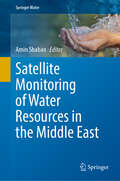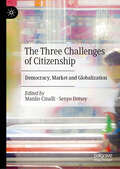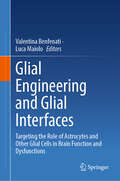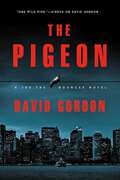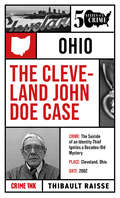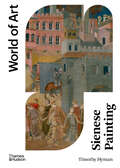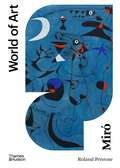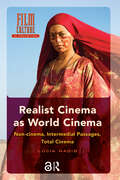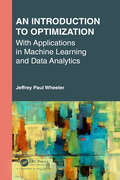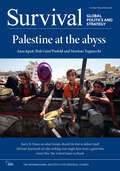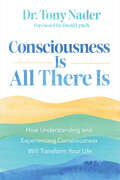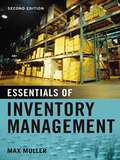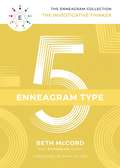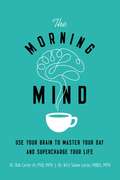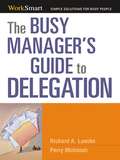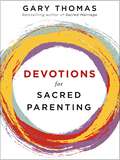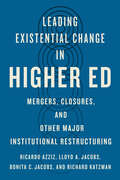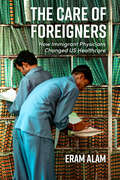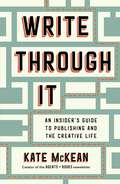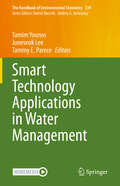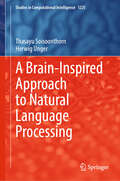- Table View
- List View
Satellite Monitoring of Water Resources in the Middle East (Springer Water)
by Amin ShabanThis book presents both updated and new measurements on water resources from selective pilot areas form the Middle East. Demand for water has become very crucial notably in arid and semiarid regions like in the Middle East. The changing climate and the increased population are the most striking challenges on water resources in this region where the largest part of its territory is dry lands and deserts with minimal precipitation and high evaporation rates, and thus, the average per capita of water does not exceed 25 m3/year. This resulted in developing many studies and researches in different Middle East countries to clearly identify and assess the hydrological characteristics of the available water resources and to explore new resources in order to secure balanced water supply/demand. As a first of its type, this book introduces comprehensive knowledge on the successful reports of the use of satellite images in water studies in the Middle East, and the economic value resulted from adopting these techniques. Based on illustrated case-studies the book will represent a significant resource for a large number of experts, academics, researchers, engineers and different-level stakeholders including the decision makers.
The Three Challenges of Citizenship: Democracy, Market and Globalization
by Manlio Cinalli Senyo DotseyThis book emphasizes the concept of citizenship as a driving force behind navigating the complexities of our modern world, as it explores the full potential and power of citizenship in relation to democracy, the market, and globalization. The book takes readers on a thought-provoking journey through the intricate interplay between citizenship and these three fundamental aspects of our contemporary world. As society grapples with existential threats ranging from democratic backsliding and economic inequality to the complex realities of globalization, this edited volume seeks to transcend conventional notions of citizenship. With populism thriving and traditional nation-state boundaries blurring, the authors argue for a redefined, proactive understanding of citizenship—one that encourages active participation, critical engagement, and robust discourse. This compelling read will intrigue scholars, researchers, graduate students, policymakers and practitioners seeking to deepen their understanding of the dynamic interplay between citizenship and current global issues. By bridging theoretical insights with real-world implications, this collection fosters an interdisciplinary dialogue that enriches scholarly engagement.
Glial Engineering and Glial Interfaces: Targeting the Role of Astrocytes and Other Glial Cells in Brain Function and Dysfunctions
by Valentina Benfenati Luca MaioloThis book focuses on the most recent tools unveiling the role of glial cells in brain function and dysfunction, especially involving epilepsy, ischemia, and glioma. It introduces this emerging field, herein called Glial Engineering, dealing with the development and application of technologies targeting glial cells, with a special focus on astrocytes. The latest glial cell research with biomaterials, gene modification, bioelectronic devices, and computational methods is highlighted. This is an ideal book for undergraduate and research students in tissue engineering, biomedical engineering, neural engineering, chemistry, biomaterials science, and regenerative medicine as well as researchers in the field of biophysics, neurophysiology, and neuroscience.
The Pigeon: A Joe the Bouncer Novel (Joe The Bouncer)
by David GordonA BookPage best mystery of the month. A New York mob fixer’s search for a stolen racing pigeon sends him into a warren of assassins. Harvard dropout and ex-Special Forces operative Joe Brody is climbing the ranks in the criminal underworld. After successfully executing multiple missions for the various crime syndicates that run New York City, he has come to earn the trust and respect of the city’s most dangerous denizens. Which is why his newest task — retrieving a pet pigeon snatched from a rooftop coop in Brooklyn — has Joe puzzled … until he learns that the bird is valued at close to a million dollars. Joe hatches a plan to sneak into the luxury park-side apartment building where the pigeon is held captive. But that simple plan takes a deadly turn when he stumbles upon a nest of international war criminals and a ruthless building manager overseeing the nefarious operation. Fearing that Joe's entry into the building has somehow compromised the scheme, they put a bounty on his head. In New York, Joe is untouchable, but his new foes come from outside the flock, and he’ll need a wing and a prayer to elude their assassins. With high-stakes action sequences punctuated by laugh out loud humor, The Pigeon is an entertaining caper with nods to vintage crime fiction by masters like Elmore Leonard and Richard Stark. It’s a perfect entry point into David Gordon’s enjoyable Joe the Bouncer series, and a great continuation for returning fans.
The Cleveland John Doe Case (50 States of Crime)
by Thibault RaisseOhio. A suicide, no fingerprints, no identity. In July 2002, the Eastlake police discovered a decomposed body in a modest studio apartment in Cleveland, Ohio. It appeared to be a suicide by firearm. The man was Joseph Newton Chandler III, a retiree whom neighbors and former colleagues described as quiet, secretive, and strange. But as the investigation progressed, less and less about Joseph’s life and identity made sense. In 2018, thanks to scientific advances in DNA, the man’s true identity was finally discovered: Robert Ivan Nichols. A veteran with a wife and three sons, Nichols eventually left his family, telling his wife "One day you will know why." A few years later, in 1965, his family reported him missing. By 1978, he had stolen the identity of Joseph Newton Chandler III, who had been killed in a car accident at eight years old. But who was this man and why did he change his name? What secret was he trying to hide? Thibault Raisse examines the case, exploring the many theories that have emerged, from the craziest to the most credible. Among these theories is a possible connection to the Zodiac Killer, whose murders date back to 1968 and 1969 in California. 50 States of Crime: France’s leading true crime journalists investigate America’s most notorious cases, one for every state in the Union, offering up fresh perspectives on famously storied crimes and reflecting, in the process, a dark national legacy that leads from coast to coast.
Sienese Painting (World of Art)
by Timothy HymanAn essential visual overview for students and readers with an interest in Sienese art, history, and Renaissance culture. For two centuries, the city-republic of Siena was home to a brilliant succession of painters who produced some of the greatest masterpieces of all time. This overview by Timothy Hyman is an essential introduction to this extraordinary artistic tradition. Taking a broadly chronological approach, it moves from the fourteenth-century Siena of Duccio, Simone Martini, and the Lorenzetti brothers to the fifteenth-century city of Sassetta and Giovanni di Paolo. Hyman combines perceptive visual analysis of the distinctive styles and conventions of Sienese painting with clear explanations of traditional techniques, such as fresco and tempera. The works are also placed in their social and religious context through discussion of Siena’s system of government, its civic consciousness, the importance of the Franciscan movement, and the cults of local saints. An accomplished writer, curator, and practicing artist, Hyman brings his breadth of knowledge, experience, and personal enthusiasm to this brilliant, extensively illustrated, and newly revised overview of Sienese art.
The Collected Poems of William Carlos Williams: 1909-1939
by William Carlos Williams Christopher MacGowanConsidered by many to be the most characteristically American of our twentieth-century poets, William Carlos Williams "wanted to write a poem / that you would understand / ,,,But you got to try hard—." So that readers could more fully understand the extent of Williams' radical simplicity, all of his published poetry, excluding Paterson, was reissued in two definite volumes, of which this is the first.
Miró (World of Art)
by Roland PenroseA new edition of this classic illustrated survey on the life and work of Spanish surrealist Joan Miró by historian and close friend Roland Penrose. Among the great twentieth-century masters, the surrealist painter Joan Miró stands out for the atmosphere of wit and spontaneity that pervades his work. Author and artist Roland Penrose, a friend of Miró’s for almost five decades, discusses Miró’s art through its many phases. Penrose also examines its major features—the birth of his signs and symbols; his series of anguished peintures sauvages in the 1930s; his lyrical, poetic gouaches; his monumental sculptures and ceramics; his unprecedented use of poetic titles; and his attachment to nature and the night. A brief epilogue by Eduardo de Benito, London correspondent of the Spanish art periodical Lápiz, illustrates the developments of Miró’s last years. This new revised edition, now illustrated in color throughout, includes a foreword by Antony Penrose, Roland’s son, outlining the relationship between his father and the artist, as well as updates to the bibliography.
Realist Cinema as World Cinema: Non-cinema, Intermedial Passages, Total Cinema (Film Culture in Transition)
by Lúcia NagibThis book presents the bold and original proposal to replace the general appellation of ‘world cinema’ with the more substantive concept of ‘realist cinema’. Veering away from the usual focus on modes of reception and spectatorship, it locates instead cinematic realism in the way films are made. The volume is structured across three innovative categories of realist modes of production: ‘noncinema’, or a cinema that aspires to be life itself; ‘intermedial passages’, or films that incorporate other artforms as a channel to historical and political reality; and ‘total cinema’, or films moved by a totalising impulse, be it towards the total artwork, total history or universalising landscapes. Though mostly devoted to recent productions, each part starts with the analysis of foundational classics, which have paved the way for future realist endeavours, proving that realism is timeless and inherent in cinema from its origin.
An Introduction to Optimization with Applications in Machine Learning and Data Analytics (Textbooks in Mathematics)
by Jeffrey Paul WheelerThe primary goal of this text is a practical one. Equipping students with enough knowledge and creating an independent research platform, the author strives to prepare students for professional careers. Providing students with a marketable skill set requires topics from many areas of optimization. The initial goal of this text is to develop a marketable skill set for mathematics majors as well as for students of engineering, computer science, economics, statistics, and business. Optimization reaches into many different fields.This text provides a balance where one is needed. Mathematics optimization books are often too heavy on theory without enough applications; texts aimed at business students are often strong on applications, but weak on math. The book represents an attempt at overcoming this imbalance for all students taking such a course.The book contains many practical applications but also explains the mathematics behind the techniques, including stating definitions and proving theorems. Optimization techniques are at the heart of the first spam filters, are used in self-driving cars, play a great role in machine learning, and can be used in such places as determining a batting order in a Major League Baseball game. Additionally, optimization has seemingly limitless other applications in business and industry. In short, knowledge of this subject offers an individual both a very marketable skill set for a wealth of jobs as well as useful tools for research in many academic disciplines.Many of the problems rely on using a computer. Microsoft’s Excel is most often used, as this is common in business, but Python and other languages are considered. The consideration of other programming languages permits experienced mathematics and engineering students to use MATLAB® or Mathematica, and the computer science students to write their own programs in Java or Python.
Survival: October–November 2025
Survival, the IISS’s bimonthly journal, challenges conventional wisdom and brings fresh, often controversial, perspectives on strategic issues of the moment.In this issue:· Barry R. Posen maintains that European defence planners must extract maximum combat power from existing European force structures by way of a large force that can be dispatched quickly for maximum effect on Russian decision-making· In the wake of the 12-Day War, Michael Eisenstadt argues that the key question is whether Israel and the United States can negotiate a broader and better nuclear deal with Iran and deter it from rebuilding its nuclear programme· Nigel Gould-Davies reflects that international relations is in practice a craft rather than a science, in which individual choices and personal diplomacy are now more relevant than ever· Marcel Berni and Marco Jorio assess the contradictions of Switzerland’s commitment to neutrality, and how the country might embrace a less rigid version for the contemporary security environment· And nine other thought-provoking pieces, as well as our regular Book Reviews and Noteworthy column.To read free articles from the journal, please visit its homepage at https://www.tandfonline.com/journals/tsur20.Editor: Dr Dana AllinManaging Editor: Jonathan StevensonAssociate Editor: Carolyn WestEditorial Assistant: Anna Gallagher
Consciousness Is All There Is: How Understanding and Experiencing Consciousness Will Transform Your Life
by Dr. Tony NaderNEW YORK TIMES AND USA TODAY BESTSELLERFrom a renowned Vedic scholar, leader of the Maharishi Foundations, and Harvard-trained neuroscientist: a radical new paradigm for understanding Consciousness and finding enlightenment, peace, and fulfillmentDr. Tony Nader, a renowned Vedic scholar and neuroscientist, offers a direct path to peace for ourselves and our world that anyone can obtain—simply by delving into our own Consciousness. Dr. Nader provides the methods, tools, and guidance for connecting with our authentic inner nature and understanding how Consciousness is the essence of all existence, including addressing such fundamental questions as:What is the key to a well-lived, flourishing life in which we can all coexist in peace? Can freedom be compatible with law and order?How can we meet all our challenges as individuals and a society, including the environment, genetic engineering, and the rapid development of artificial intelligence?True wellness is a state of profound clarity, peace, and contentment, resulting from connection with our pure Consciousness. By enlivening our coherence between our Consciousness and the external world, we can find our happiest and highest states of ourselves."Consciousness Is All There Is will open doors of perception for you to a new and profound understanding of life."— Marci Shimoff, #1 New York Times best-selling author of Chicken Soup for the Woman's Soul and Happy for No Reason
Essentials of Inventory Management
by Max MullerInventory management is about more than counting what you've got. It's about understanding business realities and making decisions that balance current demand with future needs-while keeping overhead and operating costs to a minimum. Now in its Second Edition, Essentials of Inventory Management gives inventory professionals the information they need to maximize productivity in key areas, from physical stock issues to problem identification and resolution to technologies like RFID and other automated inventory mechanisms. Perfect for novice and veteran managers alike, this ultra-practical book covers topics such as: Forecasting and replenishment strategies * Differences between retail and manufacturing inventories * Materials requirements planning and just-in-time inventory systems * Simple formulas for calculating quantities and schedules * Management of inventory as a physical reality and a monetary value * Supply chain risk management Complete with detailed examples, handy tools, and a revised and expanded chapter analyzing "Why Inventory Systems Fail and How to Fix Them," this nontechnical yet thorough guide is perfect for both instructional and on-the-job use.
The Enneagram Type 5: The Investigative Thinker (The Enneagram Collection)
by Beth McCordThe Enneagram Collection is for anyone who wants to have a deeper understanding of their Enneagram type. The Enneagram Type 5: The Investigative Thinker is an interactive book that focuses on those who have a core desire to be capable and competent. The book explores the unique motivations, longings, strengths, and weaknesses of a Type 5. The Enneagram Type 5: The Investigative Thinker is a great self-assessment resource for all spheres of life, including:Personal and professional relationshipsFaith communitiesStudents and even pop cultureAuthor Beth McCord teaches readers how to transform self-limiting behaviors into life-enhancing personal empowerment. Books from The Enneagram Collection are great for anyone newly interested in the Enneagram or longtime Enneagram enthusiasts. Inside readers will find:Space to journal about their uniqueness, goals for inner stability, and ideals for achieving peace of mindTeachings about the strengths, challenges, and opportunities that a Type 5 needs in order to build a more meaningful life, lasting relationships, and a deeper understanding of God and one's selfThis ancient personality typing system identifies nine types of people and how they relate to one another. It helps people discover what motivates them, their fears, and how best to interact with others.Not a Type 5 or want to learn about the other Enneagram types? Check out the rest of The Enneagram Collection by Enneagram coach, author, and speaker Beth McCord.
A Mother's Legacy: Your Life Story in Your Own Words
by Thomas NelsonAs a busy mom, you don't always have time to reflect on your memories with your family. A Mother's Legacy makes it easy to journal your memories and create a cherished family keepsake. Designed in a 12-month format, each month features 12 thoughtful prompts with space to write a personal answer. Your family will learn answers to questions such as:What was your favorite pastime as a child?Who gave you your name and why?Describe your childhood bedroom.What was the silliest thing you ever did?This is an ideal gift for any mom in your life for Mother's Day, baby showers, birthdays, and gift-giving holidays. Share your history, including childhood memories, lighthearted incidents, family traditions, and dreams you've lived. This written legacy will become a window to your heart for your loved ones.Check out other titles in this series: A Father's Legacy and A Grandparent's Legacy.
The Morning Mind: Use Your Brain to Master Your Day and Supercharge Your Life
by Dr. Robert Carter III Kirti Salwe Carter, MBBS, MPHUnleash positive thinking and productive imagination, and flip negative thoughts and behaviors into a lifetime to improve every aspect of your life—each morning, one day at a time.Bad habits. Bad feelings. Bad mornings that turn into regrettable days. Banish them all with simple brain hacks that flip negative thoughts and behaviors into positive, productive ones.The Morning Mind makes it easy. Based on findings from neuroscience and medicine, Dr. Robert Carter and Dr. Kirti Carter help you tamp down on the fear-driven reptile brain and tap into the part linked to thinking and imagination.With topics ranging from diet and hydration to exercise and meditation, you&’ll find ideas for activating your brain—and improving every aspect of your life:Restore healthy cycles of waking and sleepingBlock harmful cortisol hormonesBoost mental performanceCreate calmer morningsDevelop self-disciplineStimulate creativityImprove your leadership skills Instead of dragging through your day, learn to wake up refreshed, recharge regularly, and live better than ever. From the moment the alarm clock rings, The Morning Mind helps you greet each day with gusto.
The Busy Manager's Guide to Delegation (WorkSmart)
by Richard Luecke Perry McIntoshDelegation amounts to a lot more than just passing work off onto subordinates, and when handled correctly, it gives managers a chance to lead more effectively.Authors Richard A. Luecke and Perry Mcintosh present leaders with a straightforward, five-step process for mastering delegation--and increasing their output. The Busy Manager&’s Guide to Delegation teaches you to set the stage for excellent results, what to do if things go wrong, and ways to ensure that all their people benefit from the experience.In this book, you&’ll discover:which tasks to delegate;how to identify the right people for the jobs;how to assign tasks;how to monitor progress and provide feedback;and how to evaluate performance.Filled with quick tips, exercises, self-assessments, and practical worksheets, The Busy Manager&’s Guide to Delegation offers busy managers a way to strengthen their departments by focusing their newfound time and energy on developing the skills of their people.
Devotions for Sacred Parenting: Growing in Christ as You Raise Godly Children (A 52-Week Devotional – Perfect for Seasoned, New, and Expectant Christian Parents
by Gary ThomasTransform your life and your family with a one-year devotional to help you fulfill one of the most important callings in your life—being a parent.Raising children is a sacred calling—and not for the faint of heart. It shapes the parent every bit as much as parents shape their children. In Devotions for Sacred Parenting, Gary Thomas, author of Sacred Parenting, delves deeper into the conversation and contemplates the soul-transforming journey of being a parent.Many books have been written about how to parent your children effectively, how to become a better parent, and how effective parenting produces better kids. Devotions for Sacred Parenting explores an entirely different reality: how parenting transforms you, the parent. It explores the spiritual dynamics of parenting and why caring for your children is such an effective discipline in shaping your soul and forming the character of Christ within you.With all new material, 52 devotions explore the spiritual dynamics of parenting. These life-related devotions are creative, fresh, and encouraging, inspiring mothers and fathers to look at parenting from a different perspective—as a holy and high calling from God, and as an opportunity to grow spiritually as you strive to raise godly children. Devotions for Sacred Parenting is the perfect gift for Mother's Day, Father's Day, baby showers, birthdays, or any special occasion.Devotions for Sacred Parenting helps you understand how God is parenting you as you parent your children.
Leading Existential Change in Higher Ed: Mergers, Closures, and Other Major Institutional Restructuring
by Ricardo Azziz Lloyd A. Jacobs Bonita C. Jacobs Richard KatzmanA guide on how to strategically lead institutions of higher education through mergers and other major institutional restructurings. <P><P> Higher education is at a crossroads. With demographic shifts, financial constraints, shrinking enrollments, and the demand for institutional innovation, universities and colleges are grappling with monumental challenges. In Leading Existential Change in Higher Ed, Ricardo Azziz, Lloyd A. Jacobs, Bonita C. Jacobs, and Richard Katzman offer invaluable insights into how institutional leaders can successfully navigate mergers, closures, and other large-scale transformations. <P><P> The authors explore the critical components of successfully leading institutional restructuring—such as pacing change, managing resistance, and harnessing the power of early adopters—while also recognizing the obstacles leaders face. Using vivid examples from real mergers in higher education, this book demonstrates how and why versatile leadership is essential as colleges and universities face an increasingly uncertain future. Whether managing a complex merger, preparing for potential closure, or undertaking other major institutional restructuring, leaders must be willing to embrace difficult decisions and act decisively before institutional decline becomes irreversible. <P><P> Drawing on decades of leadership experience and research, this book provides actionable strategies for higher education leaders to take charge of change, rather than be swept away by it. Leading Existential Change in Higher Ed is an essential guide for college and university presidents and chancellors, trustees, policymakers, and other executives and stakeholders who seek to lead and guide institutions of higher education through turbulent times.
The Care of Foreigners: How Immigrant Physicians Changed US Healthcare
by Eram AlamWhy did South Asian physicians become essential to US health care starting in 1965? <P><P> For more than 60 years, the United States has trained fewer physicians than it needs, relying instead on the economically expedient option of soliciting immigrant physicians trained at the expense of other countries. In The Care of Foreigners, Eram Alam examines this migratory dynamic that began during the Cold War. <P><P> The passage of the Hart–Celler Immigration and Nationality Act of 1965 expedited the entry of foreign medical graduates (FMGs) from postcolonial South Asia and sent them to provide care in shortage areas throughout the United States. Although this arrangement was conceived as temporary, over the decades it has become a permanent fixture of the medical system, with FMGs comprising at least a quarter of the physician labor force since the act became law. This cohort of practitioners has not been extensively studied, rendering the impacts of immigration and foreign policy on the everyday mechanics of US health care obscure. Alam foregrounds global dynamics embedded in the medical system to ask how and why Asian physicians—and especially practitioners from South Asia—have become integral to US medical practice and ubiquitous in the US public imaginary. <P><P> Drawing on transcripts of congressional hearings; medical, scientific, and social scientific literature; ethnographies; oral histories; and popular media, Alam explores the enduring consequences of postcolonial physician migration. Combining theoretical and methodological insights from a range of disciplines, this book analyzes both the care provided by immigrant physicians as well as the care extended to them as foreigners.
Write Through It: An Insider's Guide to Publishing and the Creative Life
by Kate McKeanDiscover what every new and aspiring author needs to know about the publishing industry and how to navigate all the complicated feelings that come with writing a book in this no-nonsense guide from literary agent, author, and creator of the popular newsletter Agents & Books Kate McKean.Writers all want the secret to getting published: the magic formula for a query letter, the list of agents who will instantly say yes, and the perfect marketing campaign to hit &“The List.&” But writing is about so much more than the intellectual act of putting pen to paper—writers also deserve reassurance that the emotional highs and lows of writing is a normal, valid part of the process. And it might seem easier to focus on the nuts and bolts of writing books—word counts, query letters, and author platforms—than the messy feelings that accompany writing like doubt, fear, and hope, but the two things are inextricably linked. Write Through It is a candid, actionable guide to navigating the rollercoaster ride of writing and publishing, both on and off the page. Literary agent and author Kate McKean has been educating authors and demystifying publishing for years in her popular newsletter Agents & Books, and now, in these pages, she walks writers of all genres through every stage of the writing and publishing process and its accompanying emotional moments. From the uncertainty of knowing when you should stop fiddling with your book and start pitching to agents to how to deal with the sting of rejection and the elation (and fear) of getting a book deal, Write Through It covers it all. Drawing from her own extensive experience, McKean goes beyond the practicalities of writing and publishing to address the less-talked-about emotional side of the journey. This book is a must-read for any writer looking to understand the full spectrum of the writing life.
The Devil Crept In: A Novel
by Ania AhlbornAn unforgettable horror novel from bestselling sensation Ania Ahlborn—hailed as a writer of “some of the most promising horror I’ve encountered in years” (New York Times bestselling author Seanan McGuire)—in which a small-town boy investigates the mysterious disappearance of his cousin and uncovers a terrifying secret kept hidden for years.Young Jude Brighton has been missing for three days, and while the search for him is in full swing in the small town of Deer Valley, Oregon, the locals are starting to lose hope. They’re well aware that the first forty-eight hours are critical and after that, the odds usually point to a worst-case scenario. And despite Stevie Clark’s youth, he knows that, too; he’s seen the cop shows. He knows what each ticking moment may mean for Jude, his cousin and best friend. That, and there was that boy, Max Larsen...the one from years ago, found dead after also disappearing under mysterious circumstances. And then there were the animals: pets gone missing out of yards. For years, the residents of Deer Valley have murmured about these unsolved crimes…and that a killer may still be lurking around their quiet town. Now, fear is reborn—and for Stevie, who is determined to find out what really happened to Jude, the awful truth may be too horrifying to imagine.
Smart Technology Applications in Water Management (The Handbook of Environmental Chemistry #139)
by Tamim Younos Tammy E. Parece Juneseok LeeThis book reviews the latest advances and practical applications of smart technologies applied to water resource management. Bridging environmental chemistry, engineering, and information technology, the book offers a multidisciplinary perspective on how digital innovations are reshaping water monitoring, infrastructure diagnostics, and decision-making processes. Chapters by expert contributors cover topics such as the applications of machine learning for drinking water pipeline replacement, geospatial technologies, satellite and remote sensing technologies, Internet - of - Things (IOT), cybersecurity, robotics in water monitoring and artificial intelligence. Particular attention is given to the applications in real-time modelling of flood forecasting in urban drainage systems and the implementation of smart water networks. With detailed case studies and industry insights, this book highlights practical implementations such as smart water networks, optimal sensor deployment, and AI-driven service line material detection. Given its breadth, the book is a valuable resource for researchers, scholars and students, and serves as a roadmap for water resource engineers and planners tackling water security and diverse water resources portfolios.
Spielen in der Kinderpsychotherapie: Der Ansatz der Biografisch-Systemischen Spieltherapie (BSST) (Psychotherapie: Therapiegestaltung & Praxismanagement)
by Gerhard Zarbock Emily CarrollObwohl fast alle Kindertherapeut*Innen mit ihren Patienten spielen und es vielfältige Literatur zum therapeutischen Spiel gibt, besteht der Eindruck, dass das Spiel selten als eigenständiges therapeutisches Instrument genutzt wird. In der Verhaltenstherapie dient das Spielen oft zum Beziehungsaufbau und als Verstärker am Ende der Therapiestunde. Es fehlt jedoch an Wissen, wie Rollenspiel und freies Spiel im therapeutischen Prozess zielführend eingesetzt werden können. Der integrative Ansatz der biografisch-systemischen Spieltherapie (BSST), der in diesem Buch vorgestellt wird, möchte genau an dieser Stelle notwendige therapeutische Kompetenz und Strategien vermitteln. Dabei ist das Ziel, die methodische Vielfalt der Therapeutin bzw. des Therapeuten zu erweitern, ohne dogmatisch auf die Inklusion spieltherapeutischer Interventionen zu bestehen. Zur therapeutischen Kompetenz gehört es auch flexibel zu entscheiden, in welcher Situation bestimmte therapeutische Strategien angemessen und zielführend sind. Die Biografisch-Systemische Spieltherapie und ihre Grundlagen werden ausführlich aufgezeigt, sowie wertvolle Hinweise für das therapeutische Handeln in der Praxis gegeben. Die Autor*Innen stellen vier Spielvarianten vor: störungsspezifische Spiele, szenisch-dynamische Spiele, Entwicklungsthemenspiele und Eltern-Kind-Spiele. Der Ansatz ist eine Variante der Verhaltenstherapie, kann aber auch wertvolle Impulse für psychodynamische oder systemische Therapien liefern. Die vorgestellten Strategien eigenen sich für Kinder von 4-12 Jahre. Ein wertvolles Buch für alle, die das Spielen mit jungen Patient*Innen therapeutisch wirksam einsetzen wollen!
A Brain-Inspired Approach to Natural Language Processing (Studies in Computational Intelligence #1225)
by Herwig Unger Thasayu SoisoonthornThis book brings together key ideas from neuroscience and artificial intelligence to show how they can work together. It helps readers understand how studying the brain can lead to more adaptable and efficient AI systems. Instead of treating the two fields as separate, it highlights how brain-inspired models can help overcome current challenges in AI, improve existing techniques, and spark new and creative solutions.The journey begins with the biological foundations of intelligence, focusing on the brain&’s structure, evolution, and functions, particularly the neocortex, which plays a central role in learning and prediction. Building on this foundation, the book surveys both traditional and modern AI methods in an accessible way and offers a critical analysis of their strengths and shortcomings. The discussion then moves from theory to practice, showing how brain-inspired ideas can be applied to real-world Natural Language Processing (NLP) tasks such as spelling correction and Thai word segmentation, where conventional models often struggle with nuance and complexity. In its final sections, the book reflects on the broader significance of integrating neuroscience and AI, encouraging continued exploration and innovation at the intersection of these disciplines. Key benefits of this book include: - Exploring biologically plausible models of intelligence to open new pathways- Gaining foundational insights into how neuroscience can inform AI design- Presenting practical examples to enhance NLP tasks in complex languages- Offering a testbed for experimentation with brain-inspired computational models- Serving as a valuable resource for advanced students, researchers, and professionals seeking to deepen their understanding of nature-inspired intelligent systems While refining existing AI models may lead to meaningful progress, it remains uncertain whether such approaches alone can achieve a deeper form of intelligence. By contrast, drawing inspiration from the structure and function of the human brain may offer a promising direction toward creating systems that are more flexible, adaptive, and capable of exhibiting human-like behavior.
